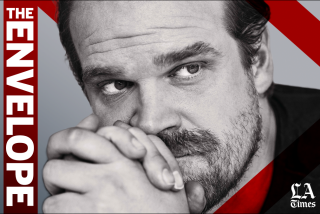MOVIE REVIEW : Hopper as a Hippie Icon in Familiar ‘Flashback’
- Share via
In “Flashback” (citywide), the casting of Dennis Hopper as an Abbie Hoffmann-like radical prankster is weirdly dislocating. Still primarily identified with “Easy Rider,” Hopper is the shaggy archetype of ‘60s hippie anomie.
The movies in which he has subsequently appeared, such as “Apocalypse Now,” “River’s Edge” and “Blue Velvet,” have crystallized the nightmarish essence of that archetype. His Frank in “Blue Velvet,” the psychosexual terrorist getting high on the inhalation of some unmentionable gas, is like a worst-possible-case hippie. He is the confirmation of every blue-nose paranoid fantasy about what the ‘60s could do to you if you yielded to its liberations.
In “Flashback,” however, which opens in contemporary San Francisco, Hopper’s Huey Walker isn’t supposed to be a burnt-out case. Despite his scraggly derelict’s appearance and screw-loose antics, he is wised-up and politically right on. He is, God help us, the conscience of the ‘60s. And that’s where the dislocation comes in. Hopper represents the fringes of hippiedom for us, yet his character here is also being promoted as a robust politico--an Abbie Hoffman in Rip Van Winkle drag.
Huey secured his radical rep 20 years ago by unhooking Spiro Agnew’s train compartment from the rest of the train during a vice presidential campaign stop. Arrested on the spot by the FBI, he gave them the slip. Rearrested after two decades in hiding, the G-men are in no mood to be humiliated again. A straight-arrow rookie agent, Kiefer Sutherland’s John Buckner, is assigned to transport the handcuffed Huey from San Francisco to Spokane. The movie is about how they touch off emotions in each other that lead to a symbolic rapprochement. The ‘60s shakes hands with the ‘80s. Or is it the ‘90s? Anyway, no hard feelings.
There’s a healthy heaping of nostalgia in “Flashback” and not all of it is for the halcyon hellishness of ‘60s radicalism. Director Franco Amurri (an Italian making his American debut) and screenwriter David Loughery lard the film with nostalgia for just about everything to do with the ‘60s. Even the FBI comes in for some wet-eyed moments. This may seem like a remarkably ecumenical approach, but the balancing act doesn’t make much sense except as a commercial cop-out. The film starts out on a high (literally), but it becomes clear after the halfway point that nobody is going to get trounced--hippies, G-men, yuppies are all rendered equally harmless. Instead of an astringent, the comedy acts as a disinfectant.
The plot device of “Flashback” is similar to “Midnight Run,” and the similarity kills some of the film’s enjoyment for us. Even at its most original, as in the early, tentative sequences with Huey and Buckner sizing each other up, it seems embalmed in too-familiar trappings. Amurri knows how to handle action, and Loughery writes sharp, prickly dialogue, but they don’t seem to recognize that the movie’s core is the contentious rapport between the co-stars.
Huey’s brain-scrambled wiliness is a great foil to Buckner’s no-nonsense severity, and the two actors play some amazing variations on that discordancy. Then comes a plot twist so jarring that the actors, and the film, never recover. Like “Midnight Run,” “Flashback” attempts to be too many different movies; it sidles opportunistically from loopy comedy to woozy weepy--it becomes “Wheezy Rider.”
The nutso compromises and wrong turns in “Flashback” may be the result of trying to do justice to the free spirit of the ‘60s while also trying to cash in on it. One of the truest points in the movie is that Huey doesn’t mind being arrested because he thinks it will help land a book contract for his autobiography. Now that we’re into the new decade, the hip catch phrase I keep hearing is that the ‘90s will be like the ‘60s. Does this mean we’re going to be huckstered to death with ‘60s nostalgia? Is “Flashback” a “Flashforward”?
More to Read
Only good movies
Get the Indie Focus newsletter, Mark Olsen's weekly guide to the world of cinema.
You may occasionally receive promotional content from the Los Angeles Times.










